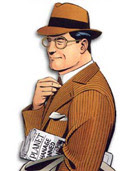Some summer reading ...
"Jim Murray: An Autobiography" (MacMillan, 1993). Following are two separate, but related, excerpts from early in the journalistic career of the Los Angeles Times' Pulitzer Prize winning sports columnist. Jim Murray passed away in August, 1998.
"Jim Murray: An Autobiography" (MacMillan, 1993). Following are two separate, but related, excerpts from early in the journalistic career of the Los Angeles Times' Pulitzer Prize winning sports columnist. Jim Murray passed away in August, 1998.
I was a Depression child. With all that connotes.
That means you never trust the system again. You know what can happen to it. That means you go through life never able to fully enjoy it. That means you have an ever-present sense of foreboding. I don't know how it affected other people but I have never been off a payroll in my life. I'm sure I would get the shingles if I didn't know I was getting a paycheck every day. I never quit a job in a huff. I swallowed guff.

I don't recommend it. It's just the way I was. A legacy of hard times, constant fear of the future. I was disgusting. Good Soldier Schweik. That's because the most terrible thing in life to me was to be out of work. I had seen what it did to people. To families. To marriages.
If someone had promised me in 1939 that I would make $32.50 a week for life if I would sign a paper, I wouldn't have hesitated.
I noticed in later life all those people who said money wasn't important to them always had plenty of it. I don't apologize for it but I never quibbled on a contract in my life. I was a terrible businessman. What I was, was a wimp.
But I knew I was a writer. When I arrived in Los Angeles in January 1944 I was the greenest of greenhorns. I had on a rust-colored overcoat you could have worn in the Bering Straits (and the temperature outside was in the eighties), wing-tip shoes, button-down collar and maybe a vest. Do you know where City Hall is? glowered the city editor, James H. Richardson. No. Do you know where the FBI is? No. Do you even know where Figueroa Street is, for cryin' out loud? No, sir. Richardson threw his pencil down. Well, can you write?! he wants to know. "Oh, Mr. Richardson!" I cooed. "I can write like a son of a bitch!"
I got the job.
_ _ _
In many ways, those were my happiest journalistic years. God we had fun on the old L.A. Examiner. It was a Hearst paper and the literati looked down their noses on it but we pulled all the stops on murders, suicides, public scandals and, particularly, on Hollywood stories. L.A. was exciting. The world was in flames. We told it all in dripping red headlines.
The city editor, Jim Richardson, was a one-eyed, iron-lunged, prototypical Hearst city editor, a tyrant of the city room. But he liked the way I wrote and for a time I was the youngest rewrite man in the whole Hearst chain, a fact of life that so irritated another rewrite man, Reggie Taverner (who had been Aimee Semple McPherson's press agent), that he quit. And loudly consigned Richardson to his "bobo" (me). Earlier, before he got too angry at me, I remember Reggie telling me one of the secrets of Aimee's ministry was that she was a practicing nymphomaniac.
I can tell you all you need to know about Jim Richardson with one anecdote. In the Black Dahlia murder, in which a young army camp follower, Elizabeth Short, was found slain and cut in half on an empty lot in L.A., the Examiner was able to score a scoop in identifying her by means of wirephotoing (a fairly new process at the time) her fingerprints to the FBI in Washington.
Armed with her identity, Richardson instructed a reporter, Wain Sutton, to telephone her mother in Massachusetts. "Don't tell her what happened," he instructed, "tell her that her daughter's just won a beauty contest at Camp Roberts. Then get all the information on her."
Sutton did as instructed. The mother happily confided her daughter's life history. Then Sutton put his hand over the mouthpiece. "Now what do I do?" he wondered. Richardson looked at him wickedly. "Now tell her," he purred. Sutton looked at him. "You miserable son of a bitch!" he said. Richardson just smiled.
I wrote that Richardson was such an unholy combination of Attila the Hun and a literary light that another rewrite man, Hank Sutherland, once dubbed him Half-Oaf, Half-Elf.
We had sob sisters, we had sacred cows. But most of all, we had fun.
Sphere: Related Content
--Hat-tip to Jerry Clark, OFS





